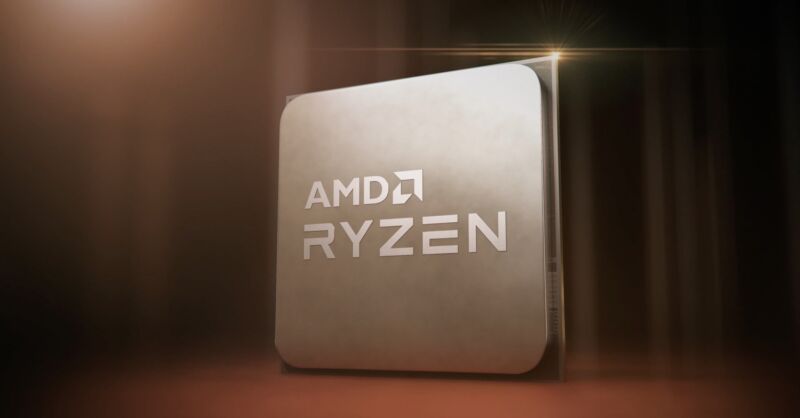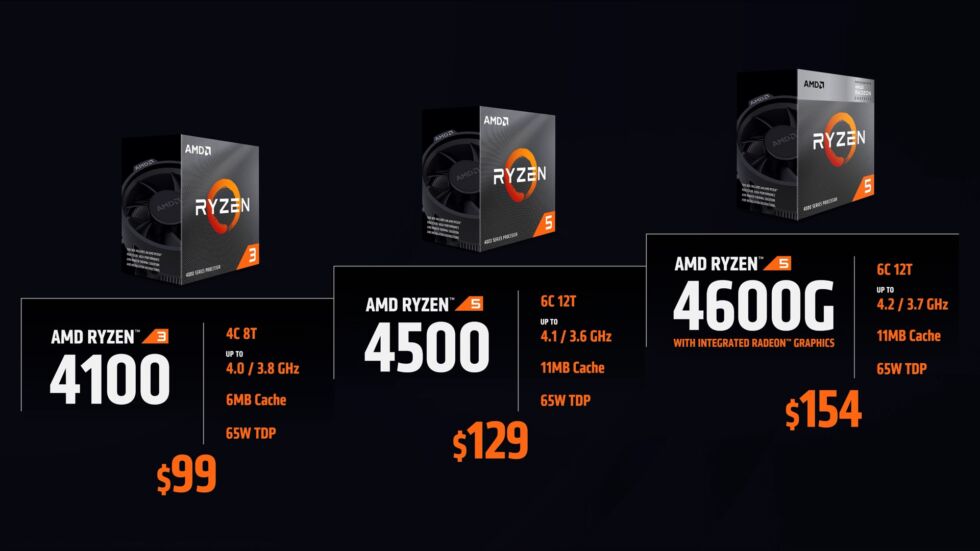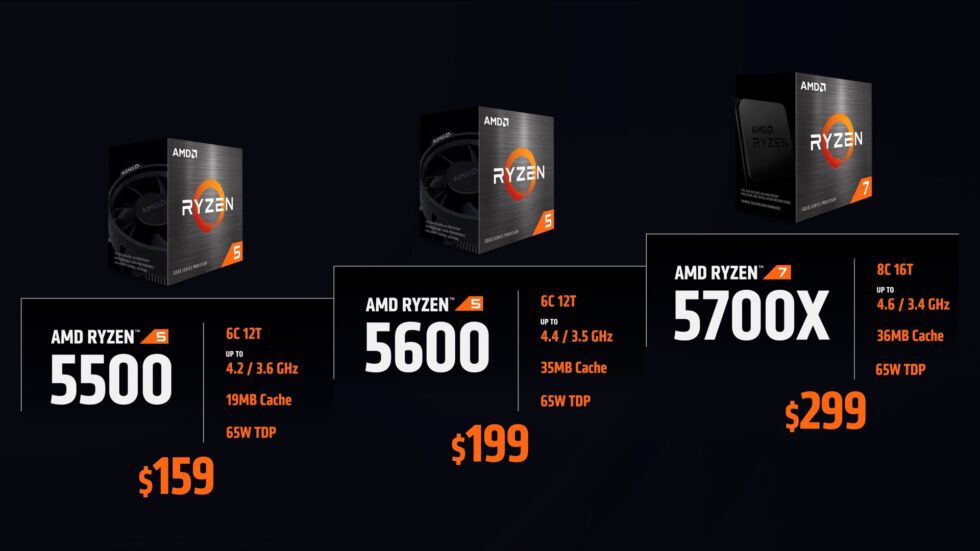
When AMD introduced its first Ryzen 5000-series chips and the Zen 3 architecture in late 2020, the lineup notably did not include any new CPUs below $300. If you wanted cheaper chips, your best bet was to go with previous-generation chips like the Ryzen 3600, 3300X, and 3100. But those processors have been difficult or even impossible to find for months, and renewed competition from sub-$200 12th-generation Intel CPUs like the Core i3-12100 and Core i5-12400 have made them a lot less appealing.
That's changing soon. AMD is releasing a slew of processors priced between $99 and $299 that should be suitable for new budget builds or upgrades to existing PCs. The Ryzen 5000-series chips are all based on AMD's aging-but-still-current Zen 3 architecture, while the cheapest chips reuse the 2019-era Zen 2 architecture to keep prices low.
AMD says that all of these chips will be available on April 4, a couple of weeks before the high-end Ryzen 7 5800X3D. All Ryzen 3 and Ryzen 5 models come with AMD's Wraith Stealth cooler, while you'll need to buy one for the Ryzen 7 CPU.
| CPU (new models emphasized) | MSRP | Architecture | Cores/threads | Clocks (Base/Boost) | Total cache (L2+L3) |
|---|---|---|---|---|---|
| Ryzen 3 4100 | $99 | Zen 2 | 4c/8t | 3.8/4.0 | 6MB |
| Ryzen 3 3100 | $99 | Zen 2 | 4c/8t | 3.6/3.9 | 17MB |
| Ryzen 5 4500 | $129 | Zen 2 | 6c/12t | 3.6/4.1 | 11MB |
| Ryzen 5 4600G | $154 | Zen 2 | 6c/12t | 3.7/4.2 | 11MB |
| Ryzen 5 5600G | $259 | Zen 3 | 6c/12t | 3.9/4.4 | 19MB |
| Ryzen 5 5500 | $159 | Zen 3 | 6c/12t | 3.6/4.2 | 19MB |
| Ryzen 5 5600 | $199 | Zen 3 | 6c/12t | 3.5/4.4 | 35MB |
| Ryzen 5 3600 | $199 | Zen 2 | 6c/12t | 3.6/4.2 | 35MB |
| Ryzen 5 5600X | $299 | Zen 3 | 6c/12t | 3.7/4.6 | 35MB |
| Ryzen 7 5700X | $299 | Zen 3 | 8c/16t | 3.4/4.6 | 36MB |
| Ryzen 7 5800X | $350 | Zen 3 | 8c/16t | 3.8/4.7 | 36MB |
The Ryzen 4100 and 4500 are AMD's first Ryzen 4000-series chips without integrated graphics—previous Ryzen 4000 chips were all APUs that were sold in OEM PCs but that never actually came to the retail market. But their relatively small amount of cache suggests that these are just Ryzen 4000 APUs with the integrated graphics shut off, so you can expect them to perform a little bit worse in some workloads than other Zen 2 processors with similar clock speeds and core counts (AMD is lumping each chip's L2 and L3 cache together in its slides, so we've done the same for consistency's sake).

Moving on to the Ryzen 4600G, it does appear to be the exact same chip that AMD has been selling to the PC companies for a couple of years now. The 4600G is nothing mind-blowing, but its $150-ish price tag and its still-decent Vega-integrated GPU might make it an appealing option if you're upgrading an old Ryzen 2400G or 3400G build, or if you're putting together a superlow-budget gaming PC for Minecraft or Fortnite.
The budget Zen 3 chips get more interesting—at $200, the Ryzen 5 5600 is a true replacement for the old Ryzen 5 3600 that should be nearly as fast as the 5600X, since the two have the exact same core count and cache. The 5700X occupies a similar spot relative to the 5800X: a bit cheaper, nearly as fast. Meanwhile, the $159 Ryzen 5 5500 loses some cache but should still be a solid upgrade over the Ryzen 5 4500 for just $30 more.

AMD's lack of newer budget Ryzen processors can be blamed in part on the chip shortage—manufacturing capacity is limited, and AMD decided to prioritize big PC makers like HP and Lenovo with its lower-end desktop chips rather than splitting them between the PC makers and the retail channel. But that absence was also because, for the first time since the mid-2000s, AMD's Ryzen 5000-series chips had an indisputable manufacturing and performance advantage over Intel. It's no coincidence that AMD's return to sub-$250 processors is happening just as Intel is becoming competitive again.
For cash-strapped enthusiasts still using X370 or B350 motherboards, today's CPU announcements come with another bit of good news: AMD is officially allowing these old motherboards to support Ryzen 4000- and 5000-series CPUs with a BIOS update. These older boards may struggle to run high-end 8-, 12-, and 16-core Ryzen chips at their full speeds, but they ought to be ideally suited to handle these less power-hungry 4- and 6-core CPUs.
Whether all of these processors will be replaced by budget-friendly Ryzen 7000 CPUs later this fall is anyone's guess. But the most likely outcome is that the same conditions that made Zen 3 processors so pricey—chip shortages plus AMD knowing it can charge a premium for its fastest parts—will make the first wave of Zen 4 chips pretty expensive, too.
reader comments
91